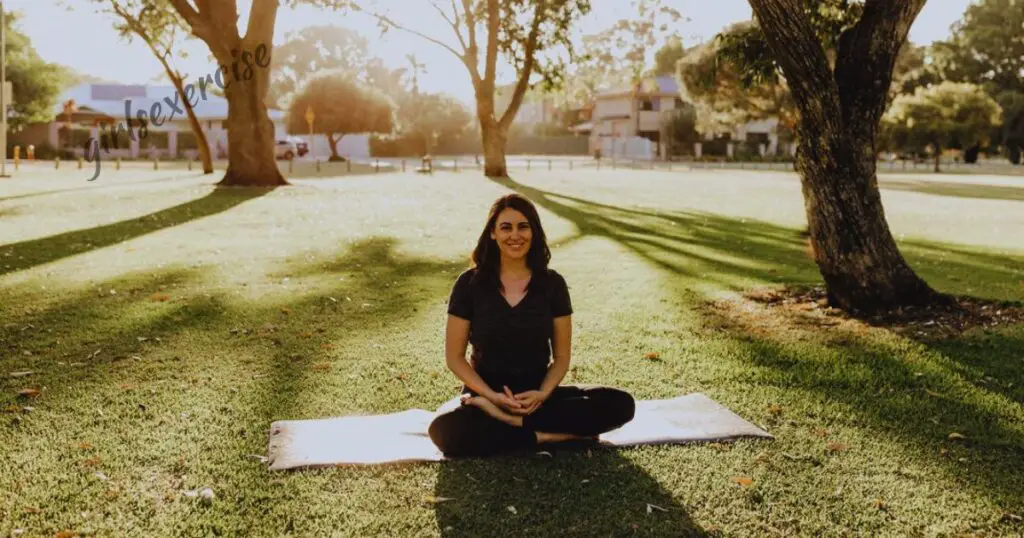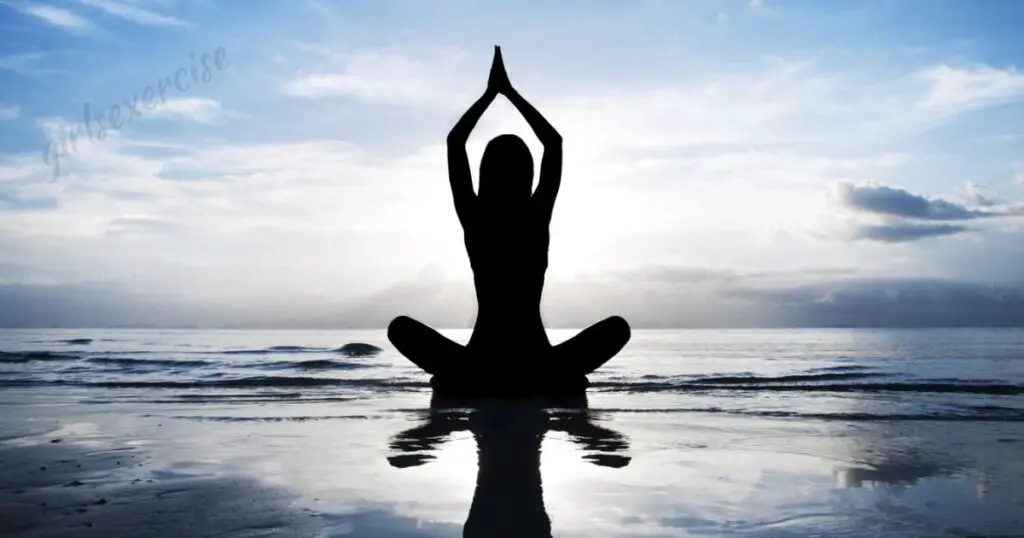Within the labyrinth of modern existence, the beacon of tranquility illuminates through the practice of meditation for stress relief. Meditation, a timeless art form, transcends the bounds of culture and era, offering a profound sanctuary amidst life’s tumultuous currents.
It serves as a compass guiding individuals through the intricate landscapes of their minds, a transformative journey fostering self-discovery and resilience. Rooted in ancient wisdom yet validated by contemporary science.
Meditation emerges as a gateway to tranquility, inviting individuals to explore the depths of their consciousness. Amidst the cacophony of daily life, it stands as an oasis, beckoning with promises of serenity and emotional balance.
Understanding the Essence of Meditation Delving into Tranquility and Self-Discovery:

Embracing Tranquility Amidst Chaos
Meditation, an ancient practice revered across cultures, beckons individuals to embark on a profound journey toward tranquility and self-discovery. At its core, it’s not merely a ritual but an immersive experience, a pathway to inner peace amidst life’s chaos.
The Inner Voyage: Navigating the Mind’s Landscape
The essence of meditation lies in its ability to guide individuals on an introspective odyssey, delving into the intricate terrains of their consciousness. It’s an invitation to explore the depths of one’s being, unveiling layers of thoughts, emotions, and perceptions.
Within this introspective realm, practitioners encounter a space where the cacophony of external pressures fades, allowing for a profound dialogue with the self. Meditation, often misunderstood as a technique solely for relaxation, is a doorway to a deeper understanding of the human psyche.
It encourages observation without judgment, fostering acceptance of one’s thoughts and feelings. This acceptance, in turn, cultivates a sense of inner harmony and resilience against the storms of daily life. Beyond its immediate calming effects, regular meditation fosters a profound sense of self-awareness.
It’s akin to embarking on an expedition through the uncharted territories of the mind, gradually unraveling the mysteries within. Through this process, individuals gain insights into their thought patterns, behaviors, and emotional triggers, enabling conscious choices and emotional regulation.
Delving into Self-Discovery
Meditation serves as a catalyst for self-discovery, unveiling layers of the self often obscured by the hustle and bustle of life. It’s a sacred space where individuals confront their fears, acknowledge their vulnerabilities, and embrace their strengths with compassion.
Moreover, this introspective practice doesn’t just unravel the individual self; it extends to fostering a deeper connection with the world. As practitioners explore their inner landscapes, they develop empathy and understanding for others, recognizing the interconnectedness of all beings.
Meditation, therefore, becomes a conduit for personal growth and interconnectedness. It’s a pilgrimage toward self-realization, guiding individuals to discover their authentic selves, fostering empathy, and nurturing a profound connection with the world around them.
In essence, it’s not merely a practice but a transformative journey toward holistic well-being—one that transcends the boundaries of time and culture, inviting all seekers to embark on a voyage of self-discovery and tranquility.
Neuroscientific Marvels Unraveling the Impact of Meditation on Brain Functionality:

The Brain’s Symphony: Unraveling Meditation’s Influence
Delve into the captivating realm where the ancient art of meditation entwines with modern neuroscience, revealing a mesmerizing symphony within the human brain. Scientific exploration elucidates the transformative effects of meditation on the brain’s intricate architecture and functionality, unveiling a tapestry of neuroplasticity and cognitive enhancement.
Rewiring the Mind: The Neurological Tapestry of Meditation
Scientific studies illuminate the profound impact of meditation on brain functionality, showcasing its ability to sculpt and reconfigure neural pathways. Through regular practice, meditation triggers neuroplastic changes, amplifying regions associated with attention, emotional regulation, and stress resilience.
This neural remodeling fosters heightened cognitive abilities, emotional intelligence, and a fortified stress response system. Neuroimaging studies unveil the mesmerizing alterations within the brain’s structure induced by meditation.
Gray matter density increases in regions responsible for memory, learning, and emotional regulation, signifying a tangible enhancement in cognitive faculties. Simultaneously, the amygdala, the brain’s emotional center, exhibits reduced activity, offering a shield against stress-related responses.
Meditation’s influence extends to the brain’s default mode network (DMN), which involves self-referential thoughts.
With consistent practice, this network undergoes transformations, reducing rumination and enhancing present-moment awareness. Such modifications lay the groundwork for a resilient mind, adept at navigating life’s challenges with clarity and composure.
Unveiling the Cognitive Symphony
The neuroscientific panorama of meditation underscores its role as a catalyst for cognitive flourishing. Beyond stress alleviation, it unveils a profound cognitive symphony—enhanced focus, heightened attentional capacities, and increased emotional regulation.
These cognitive marvels aren’t confined to the cushion; they reverberate throughout daily life, optimizing decision-making, fostering empathy, and nurturing emotional balance.
Moreover, meditation’s impact on brain functionality transcends individual well-being; it extends to societal realms. Studies suggest that communities engaging in collective meditation experiences exhibit synchronized brainwave patterns, hinting at a potential for collective harmony and empathy.
Mindful Breathing The Artistry of Oxygenating the Soul for Serenity:

The Symphony of Breath: A Gateway to Serenity
Embark on a profound exploration of mindful breathing—a timeless practice that transcends mere inhalation and exhalation, serving as a gateway to inner tranquility and profound serenity.
At its essence, mindful breathing intertwines the rhythms of the breath with the cadence of the soul, offering a transformative journey toward heightened awareness and peace.
The Dance of Oxygenation: An Art Form for Inner Harmony
Mindful breathing isn’t just a physiological act; it’s an art form that orchestrates a symphony of bodily and mental harmony. Each deliberate breath becomes a canvas where the body and mind converge, infusing every cell with revitalizing oxygen.
This intentional act unravels a cascade of physiological responses, activating the body’s relaxation response and ushering in a state of calmness. As practitioners engage in conscious inhalations and exhalations, they draw their focus to the present moment.
The breath becomes a guiding anchor, a rhythmic dance that synchronizes the body’s sensations, thoughts, and emotions. In this exquisite choreography of breath, individuals dissolve into a state of heightened awareness, shedding the burdens of the past and the anxieties of the future.
Oxygenating the Soul: A Journey to Inner Stillness
Mindful breathing extends beyond the physical act; it’s a portal to inner stillness and profound self-awareness. With each breath observed and felt, individuals cultivate a sense of presence, gently guiding their attention away from distractions and into the richness of the present moment.
This intentional focus on the breath offers a sanctuary—a space where the mind finds respite from the ceaseless chatter, allowing a sense of calm to pervade. It’s within this tranquility that the soul finds nourishment, fostering a deep connection with one’s inner landscape.
Moreover, mindful breathing becomes a transformative tool in navigating life’s ebbs and flows. As individuals harness the power of the breath, they develop resilience in the face of adversity, using this innate resource to ground themselves amidst life’s storms.
It’s a skill honed through practice, empowering individuals to access a wellspring of calmness and clarity in any circumstance.
Cultivating Presence The Antidote to Stress in the Here and Now:

The Elixir of Now: Unveiling the Antidote to Stress
Dive into the essence of cultivating presence—an antidote to the relentless waves of stress that often engulf the human experience. Presence isn’t merely a state of being; it’s a sacred sanctuary found within the folds of the present moment.
Amidst life’s chaos, it offers a refuge—a timeless space where worries of the past and anxieties of the future fade, leaving behind a serene canvas to paint the hues of existence.
Mindfulness in Motion: Weaving Stress-Resilience in the Present
Presence isn’t an elusive concept but a practice that intertwines mindfulness with the cadence of everyday life. It’s about fostering an acute awareness of the present, immersing oneself in the tapestry of the here and now.
By redirecting attention from the whirlwind of thoughts, individuals anchor themselves in the immediacy of their experiences, nurturing a profound connection with each passing moment.
In the sanctuary of presence, the mind finds solace—a reprieve from the incessant chatter and worries that often plague it. This intentional focus on the present moment becomes an elixir, fostering a sense of calmness and clarity that acts as a shield against the storms of stress.
The Alchemy of Present-Moment Awareness
Cultivating presence isn’t just a means of stress relief; it’s a transformative alchemy that permeates all facets of life. As individuals immerse themselves in the present, they uncover hidden treasures—a deeper appreciation for life’s simple joys, profound connections with others, and a heightened sense of gratitude for the abundance within each moment.
Moreover, presence isn’t a static state but a dynamic practice woven into the fabric of daily routines. Whether savoring a meal, engaging in conversation, or relishing the beauty of nature, individuals infuse each experience with undivided attention.
This conscious engagement with the present infuses vitality into life’s tapestry, making every interaction, however mundane, a profound and enriching experience. The sanctuary of presence extends its reach into the realm of relationships, fostering deeper connections and empathy.
By being fully present with others, individuals not only offer the gift of their attention but also cultivate a deeper understanding and compassion, nurturing bonds that transcend the boundaries of time and space.
The Ripple Effect How Personal Transformation Catalyzes Stress Reduction:

The Genesis of Change: Personal Transformation and Stress Alleviation
Explore the profound interplay between personal transformation and stress reduction—a symphony where individual growth becomes the catalyst for a ripple effect that traverses every facet of existence.
Personal transformation, often sparked by introspection and self-discovery, becomes the cornerstone of an intricate dance that alleviates stress and fosters a harmonious equilibrium.
From Within to Without Unraveling the Ripple Effect
The journey of personal transformation unfurls a tapestry of inner shifts—mental, emotional, and spiritual—that resonate far beyond the self. As individuals traverse the landscapes of self-discovery through practices like meditation and mindfulness, they undergo profound changes in perception, resilience, and emotional intelligence.
This metamorphosis within becomes the wellspring from which a ripple effect emanates, cascading into every aspect of life. The newfound resilience enables individuals to navigate stressors with grace, fostering a sense of calm amidst life’s tempests.
Emotional intelligence nurtures deeper connections and empathy, fostering supportive relationships that act as buffers against stress.
The Transformative Symphony: Echoes of Inner Peace
Personal transformation isn’t a solitary endeavor; its impact reverberates through communities and beyond. As individuals embody inner peace and resilience, their interactions, actions, and attitudes ripple outward, influencing the collective consciousness.
The transformative symphony extends its resonance to the collective—a community, a workplace, or even a global network. Through the embodiment of personal growth and stress resilience, individuals become beacons, inspiring others to embark on their journeys toward well-being.
Moreover, this ripple effect isn’t confined to immediate circles; it transcends boundaries, igniting a ripple that touches lives far beyond one’s reach. As individuals radiate calmness and empathy, they contribute to a collective consciousness that fosters understanding, compassion, and harmony, thereby alleviating stress on a broader scale.
Conclusion:
Meditation, a timeless practice, serves as a sanctuary for stress relief, offering more than a mere escape from life’s turbulence. It’s a transformative journey inward, fostering self-discovery, resilience, and a deeper understanding of the mind’s intricacies.
Beyond its calming effects, meditation becomes a tool for rewiring the brain, enhancing cognitive abilities, and fortifying emotional resilience against stressors. In this journey of self-exploration, meditation isn’t confined to individual realms; its impact extends to relationships, communities, and beyond.
As individuals delve into the depths of their consciousness, personal transformation becomes a catalyst for a ripple effect, nurturing a collective consciousness of empathy, harmony, and stress alleviation.
Through this intricate interplay, meditation transcends its practice, becoming a beacon guiding individuals toward holistic well-being and fostering a more tranquil, interconnected world.
Faqs About meditation for stress relief:
Can meditation really help relieve stress?
Yes, absolutely. Meditation has been proven to be an effective tool for stress relief. By engaging in mindful practices, individuals can regulate their stress response, lower cortisol levels, and promote a sense of calmness.
How long does it take to see the benefits of meditation for stress relief?
The timeline varies, but many people report feeling some benefits after just a few sessions. With consistent practice, individuals often experience more profound and lasting effects, ranging from improved mood to enhanced resilience in the face of stress.
What type of meditation is best for stress relief?
Different types of meditation can be beneficial, but mindfulness meditation is particularly renowned for stress reduction. Mindfulness involves staying present in the moment and observing thoughts without judgment. Other effective forms include loving-kindness meditation and progressive muscle relaxation.
Can meditation be a substitute for other stress management techniques?
While meditation is a powerful stress management tool, it’s often most effective when used in conjunction with other strategies. Combining meditation with healthy lifestyle choices, exercise, and social support can create a comprehensive approach to stress reduction.
How often should I meditate for optimal stress relief?
The frequency depends on personal preferences and schedules. Starting with a few minutes daily and gradually increasing the duration is a common approach. Consistency is key; even short, regular sessions can yield significant stress-relieving benefits over time.
Is meditation suitable for everyone, even beginners?
Absolutely. Meditation is inclusive and adaptable. There are various techniques, that make it accessible for beginners. Guided meditations, apps, and classes provide excellent starting points. As individuals progress, they can explore different styles to find what resonates best with them.
Can meditation help with chronic stress or anxiety disorders?
Yes, meditation can be a valuable component in managing chronic stress and anxiety disorders. Mindfulness-based interventions, in particular, have shown efficacy in reducing symptoms and improving overall well-being. However, it’s essential to consult with a healthcare professional for a comprehensive approach to mental health.



